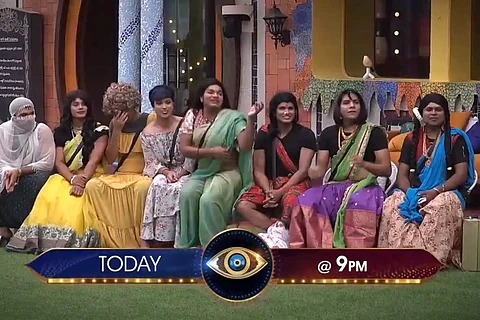

In India, crossdressing has been an old practice. Crossdressing, or the act of wearing clothes that are not typically associated with the wearer’s gender, is seen in art forms like dance, music and theatre. It is seen as artistry by some, and as a way of expression and pleasure by others. Art forms like drag, too, involve persons expressing themselves through crossdressing. It is also an integral part of many queer and transgender persons’ experience with transitioning, figuring out and expressing their gender and sexuality.
LGBTQIA+ persons often find it hard to get acceptance and are at the receiving end of hate, mockery and violence because of this expression due to queer and transphobia. This makes sensitive representation a must to normalise their experience.
Recently, however, Bigg Boss Telugu, a high grossing reality show endorsed by Star TV and featuring actor Nagarjuna as the host, used crossdressing in a task for the inmates in a manner that can only be seen as derogatory, insensitive and queer-phobic. The housemates were given a task to crossdress in different gender roles. A similar task was assigned in Bigg Boss Kannada too. The host claimed that this was to encourage gender equality, however, it failed drastically and ended up being hurtful and stigmatising.
#BiggBossTelugu4 house lo Gender equality task
— starmaa (@StarMaa) October 4, 2020
Today at 9 PM on @StarMaa pic.twitter.com/gaSMvFemZh
Here is why Bigg Boss failed to achieve what it promised otherwise.
The host Nagarjuna started with saying, “Chi Chi Chi kucho, Cudalekapotunam ninu” (chi, sit down, we can’t even bear to look at you) to a cisgender (a person whose gender is the same as assigned at birth) man dressed up in what is traditionally women’s clothing. While cis men remain unaffected by it, these words clearly show and perpetuate drag-phobia, and create a mockery of persons who express gender through crossdressing.
A participant on the show, during the task, casually said, “Nenu yento nake ardamavatamledu” which means “I don’t know what I am”. Activities and utterances such as these make a mockery out of gender dysphoria which is something that many transgender and queer persons struggle with. Gender dysphoria is the struggle a person feels when they do not feel aligned to the gender they were assigned at birth. The experience is traumatic, and dismissive representations of the same on mainstream shows such as Bigg Boss can be triggering and are insensitive to the very real hardships that many LGBTQIA+ persons face.
A majority of the male participants were seen exaggerating ‘feminine’ mannerisms while wearing women’s clothing. In doing so, the makers who assigned this task as well as the participants reinforced gender binaries and stereotypes by implying that what is considered feminine behaviour by cis men in women’s clothes is abnormal and comical, disregarding that this is how many men and queer persons actually express themselves.
Many men love to dress up, but have been taught to be deeply ashamed of it. Transphobia and homophobia can run deep even among queer persons, alienating men who appear less than masculine within the community. Normalising this insensitivity to a large audience has real life repercussions for queer men such as those who are gay, gender-fluid, gender non-conforming and so on. It normalises queer mocking - “If Nagarjuna can say it, why can't I?”
The intent to create ‘awareness’ through this task was sidetracked, to put it lightly, what with the crossdressed men reinforcing the objectification of women that is so common in popular culture and cinema. It was a manifestation of patriarchal misogyny and the male gaze that women’s bodies are subjected to, with several dialogues said in bad taste and for double entendres.
Not everyone who dresses in women’s clothing is a transgender person. However, some Bigg Boss participants were clapping their hands in mockery and imitation of trans persons, reinforcing stereotypes that anyone who crossdresses is trans, and has a choice to be that way. While a person can crossdress for pleasure, art, as an expression of their gender and sexuality, being trans is not a choice. One cannot simply put a lid on their felt gender. Such representations are an insult towards the trans community and their struggles.
Songs like ‘Chudu Pinnama’ which make fun of transgender women or the hijra community were used in this task, making the whole thing even more callous. While the Telugu states already lack acceptance of LGBTQIA+ people, with hate crimes and transphobia still rampant, such irresponsible representation on a popular show is unacceptable and condemnable.
Shows such as Big Boss Telugu, in any case, have not been open to including drag performers, transgender people and queer people. Further, by assigning such tasks and encouraging such representations, these shows also end up normalising queer-phobia, which has real life impact on LGBTQIA+ persons.
Patruni Chidananda Sastry is an Indian Classical Dancer, performance artist, and drag performer from Hyderabad. Patruni started dancing at the age of five, and has also been performing Tranimal Drag under the drag name of Suffocated Art Specimen (S.A.S). His style of drag brings unique footprints of anti-art queen. Tranimal Drag Art has been given a new Indianian approach with his style. He co-founded Dragvanti, an online website for drag community in India.